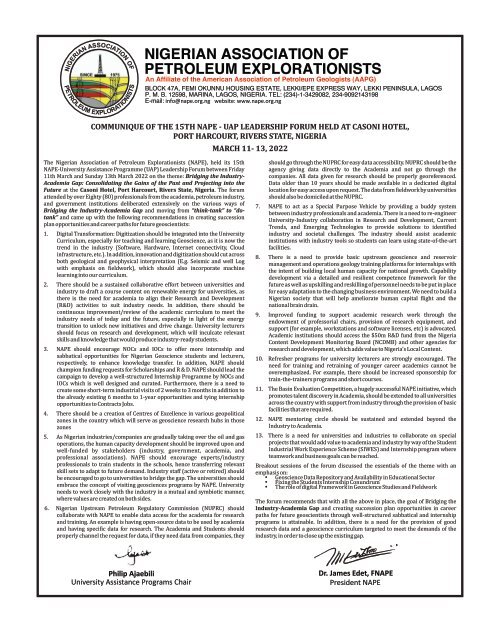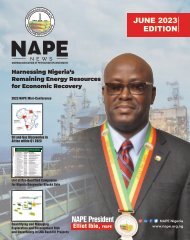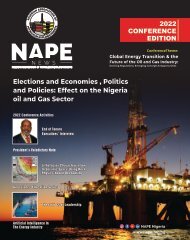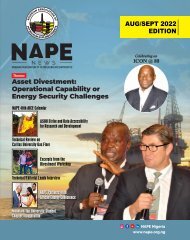NAPENews Magazine June 2022 Edition
June 2022 Edition of the NAPE News Magazine is the Mid-Year Edition. Happy reading.
June 2022 Edition of the NAPE News Magazine is the Mid-Year Edition. Happy reading.
Create successful ePaper yourself
Turn your PDF publications into a flip-book with our unique Google optimized e-Paper software.
COMMUNIQUE OF THE 15TH NAPE - UAP LEADERSHIP FORUM HELD AT CASONI HOTEL,<br />
PORT HARCOURT, RIVERS STATE, NIGERIA<br />
MARCH 11- 13, <strong>2022</strong><br />
The Nigerian Association of Petroleum Explorationists (NAPE), held its 15th<br />
NAPE-University Assistance Programme (UAP) Leadership Forum between Friday<br />
11th March and Sunday 13th March <strong>2022</strong> on the theme: Bridging the Industry-<br />
Academia Gap: Consolidating the Gains of the Past and Projecting into the<br />
Future at the Casoni Hotel, Port Harcourt, Rivers State, Nigeria. The forum<br />
attended by over Eighty (80) professionals from the academia, petroleum industry,<br />
and government institutions deliberated extensively on the various ways of<br />
Bridging the Industry-Academia Gap and moving from “think-tank” to “dotank”<br />
and came up with the following recommendations in creating succession<br />
plan opportunities and career paths for future geoscientists:<br />
1. Digital Transformation: Digitization should be integrated into the University<br />
Curriculum, especially for teaching and learning Geoscience, as it is now the<br />
trend in the industry (Software, Hardware, Internet connectivity, Cloud<br />
infrastructure, etc.). In addition, innovation and digitization should cut across<br />
both geological and geophysical interpretation (E.g. Seismic and well Log<br />
with emphasis on fieldwork), which should also incorporate machine<br />
learning into our curriculum.<br />
2. There should be a sustained collaborative effort between universities and<br />
industry to draft a course content on renewable energy for universities, as<br />
there is the need for academia to align their Research and Development<br />
(R&D) activities to suit industry needs. In addition, there should be<br />
continuous improvement/review of the academic curriculum to meet the<br />
industry needs of today and the future, especially in light of the energy<br />
transition to unlock new initiatives and drive change. University lecturers<br />
should focus on research and development, which will inculcate relevant<br />
skills and knowledge that would produce industry-ready students.<br />
3. NAPE should encourage NOCs and IOCs to offer more internship and<br />
sabbatical opportunities for Nigerian Geoscience students and lecturers,<br />
respectively, to enhance knowledge transfer. In addition, NAPE should<br />
champion funding requests for Scholarships and R & D. NAPE should lead the<br />
campaign to develop a well-structured Internship Programme by NOCs and<br />
IOCs which is well designed and curated. Furthermore, there is a need to<br />
create some short-term industrial visits of 2 weeks to 3 months in addition to<br />
the already existing 6 months to 1-year opportunities and tying internship<br />
opportunities to Contracts Jobs.<br />
4. There should be a creation of Centres of Excellence in various geopolitical<br />
zones in the country which will serve as geoscience research hubs in those<br />
zones<br />
5. As Nigerian industries/companies are gradually taking over the oil and gas<br />
operations, the human capacity development should be improved upon and<br />
well-funded by stakeholders (industry, government, academia, and<br />
professional associations). NAPE should encourage experts/industry<br />
professionals to train students in the schools, hence transferring relevant<br />
skill sets to adapt to future demand. Industry staff (active or retired) should<br />
be encouraged to go to universities to bridge the gap. The universities should<br />
embrace the concept of visiting geosciences programs by NAPE. University<br />
needs to work closely with the industry in a mutual and symbiotic manner,<br />
where values are created on both sides.<br />
6. Nigerian Upstream Petroleum Regulatory Commission (NUPRC) should<br />
collaborate with NAPE to enable data access for the academia for research<br />
and training. An example is having open-source data to be used by academia<br />
and having specific data for research. The Academia and Students should<br />
properly channel the request for data, if they need data from companies, they<br />
should go through the NUPRC for easy data accessibility. NUPRC should be the<br />
agency giving data directly to the Academia and not go through the<br />
companies. All data given for research should be properly georeferenced.<br />
Data older than 10 years should be made available in a dedicated digital<br />
location for easy access upon request. The data from fieldwork by universities<br />
should also be domiciled at the NUPRC.<br />
7. NAPE to act as a Special Purpose Vehicle by providing a buddy system<br />
between industry professionals and academia. There is a need to re-engineer<br />
University-Industry collaboration in Research and Development, Current<br />
Trends, and Emerging Technologies to provide solutions to identified<br />
industry and societal challenges. The industry should assist academic<br />
institutions with industry tools so students can learn using state-of-the-art<br />
facilities.<br />
8. There is a need to provide basic upstream geoscience and reservoir<br />
management and operations geology training platforms for internships with<br />
the intent of building local human capacity for national growth. Capability<br />
development via a detailed and resilient competence framework for the<br />
future as well as upskilling and reskilling of personnel needs to be put in place<br />
for easy adaptation to the changing business environment. We need to build a<br />
Nigerian society that will help ameliorate human capital flight and the<br />
national brain drain.<br />
9. Improved funding to support academic research work through the<br />
endowment of professorial chairs, provision of research equipment, and<br />
support (for example, workstations and software licenses, etc) is advocated.<br />
Academic institutions should access the $50m R&D fund from the Nigeria<br />
Content Development Monitoring Board (NCDMB) and other agencies for<br />
research and development, which adds value to Nigeria's Local Content.<br />
10. Refresher programs for university lecturers are strongly encouraged. The<br />
need for training and retraining of younger career academics cannot be<br />
overemphasized. For example, there should be increased sponsorship for<br />
train-the-trainers programs and short courses.<br />
11. The Basin Evaluation Competition, a hugely successful NAPE initiative, which<br />
promotes talent discovery in Academia, should be extended to all universities<br />
across the country with support from industry through the provision of basic<br />
facilities that are required.<br />
12. NAPE mentoring circle should be sustained and extended beyond the<br />
Industry to Academia.<br />
13. There is a need for universities and industries to collaborate on special<br />
projects that would add value to academia and industry by way of the Student<br />
Industrial Work Experience Scheme (SIWES) and Internship program where<br />
teamwork and business goals can be reached.<br />
Breakout sessions of the forum discussed the essentials of the theme with an<br />
emphasis on:<br />
Ÿ Geoscience Data Repository and Availability in Educational Sector<br />
Ÿ Fixing the Students Internship Conundrum<br />
Ÿ The role of digital Framework in Geoscience Studies and Fieldwork<br />
The forum recommends that with all the above in place, the goal of Bridging the<br />
Industry-Academia Gap and creating succession plan opportunities in career<br />
paths for future geoscientists through well-structured sabbatical and internship<br />
programs is attainable. In addition, there is a need for the provision of good<br />
research data and a geoscience curriculum targeted to meet the demands of the<br />
industry, in order to close up the existing gap.<br />
Philip Ajaebili<br />
University Assistance Programs Chair<br />
Dr. James Edet, FNAPE<br />
President NAPE










